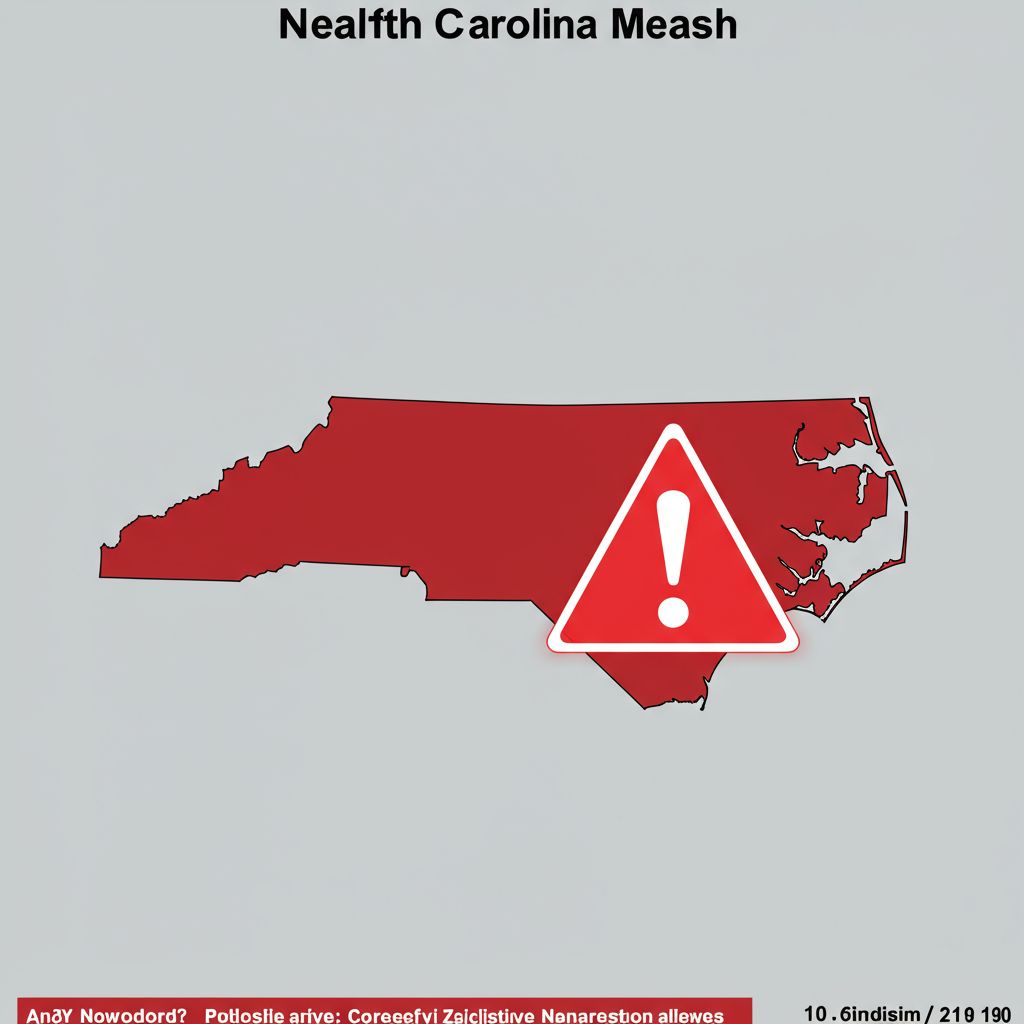North Carolina health officials have confirmed the state’s first measles case of 2025, prompting a renewed health alert as summer travel peaks. The North Carolina Department of Health and Human Services (NCDHHS) announced the confirmation on Tuesday, June 24.
The case involves a child who traveled to North Carolina from a country currently experiencing significant measles outbreaks. While in the state, the child visited locations in Forsyth and Guilford counties while potentially infectious. This confirmed case follows just one reported case in North Carolina during all of 2024 and none in the years immediately prior, highlighting the recent re-emergence of the highly contagious virus in the state.
Why Health Officials Are Concerned
Health officials across North Carolina are on high alert following the confirmation. Dr. Jennifer Mullendore, Buncombe County’s health director, expressed significant concern, emphasizing how rapidly and easily measles can spread. The virus is notoriously contagious, capable of lingering in the air for up to two hours after an infected person coughs or sneezes. This makes crowded public spaces like airports and stores potential exposure sites.
Illustrating the ease of transmission, officials note that if one person with measles is in a room with ten unvaccinated or non-immune individuals, approximately nine of those ten are likely to contract the virus. This level of contagiousness underscores the risk posed by even a single case in communities with low vaccination rates.
Understanding Measles: Symptoms and Severe Risks
Symptoms of measles typically begin 7 to 21 days after exposure. Initial signs often resemble a cold, including a high fever, cough, runny nose, and red, watery eyes. These are usually followed by a characteristic rash that often starts on the face before spreading across the rest of the body. A rash can also appear inside the mouth.
While often thought of as a childhood illness, measles is particularly dangerous for young children and can affect adults, especially if they are unvaccinated. Health experts warn of the severe potential outcomes. Tragically, roughly one out of every 1,000 people diagnosed with measles will not survive the infection.
Beyond immediate risks, health officials highlight concerning long-term complications that can arise years after a person recovers from measles. These include potentially deadly neurological symptoms that are essentially untreatable, as well as a condition where the virus severely damages the immune system, making individuals vulnerable to other infections long after the initial illness.
Public Exposure Alert: Locations Visited by Infectious Person
State and local public health departments, including the Forsyth County Department of Public Health and Guilford County Health Department, are actively investigating potential public exposure sites visited by the infectious child.
NCDHHS has released a preliminary list of locations and time frames where other individuals may have been exposed:
Piedmont Triad International Airport: Thursday, June 19, 11:30 p.m. to Friday, June 20, 1:30 a.m.
Sleep Inn (1406 Heartland Drive, Kernersville): Friday, June 20, 11:30 p.m. to 2:50 p.m. AND 5:15 p.m. to Saturday, June 21, 11:35 a.m. AND Saturday, June 21, 5:30 p.m. to Sunday, June 22, 12:20 p.m.
McDonald’s (14000 Heartland Drive, Kernersville): Morning of Friday, June 20
Greensboro Science Center (4301 Lawndale Drive, Greensboro): Friday, June 20, 1:30 p.m. to 6:15 p.m.
Ice cream shop at the Piedmont Triad Farmers Market (Greensboro): Friday, June 20, 4:40 p.m. to 5 p.m.
Greensboro Aquatic Center foyer (1921 West Gate City Blvd., Greensboro): Saturday, June 21, 10 a.m. to 12:05 p.m.
Greensboro Partee Shack (3712 South Holden Road, Greensboro): Saturday, June 21, 10:15 a.m. to 1:20 p.m.
Lowes Foods (240 Market View Drive, Kernersville): Saturday, June 21, 4:50 p.m. to 7:10 p.m.
What To Do If You Were At These Locations
Individuals who were present at these specific locations during the listed dates and times are urged to review their measles immunization records. Monitor yourself for symptoms for 21 days after potential exposure.
If you develop symptoms consistent with measles (high fever, cough, runny nose, red/watery eyes, followed by rash), call your healthcare provider or the emergency room before visiting. This allows them to take precautions to prevent potential further spread upon your arrival. Do not visit a healthcare facility without calling ahead if you suspect you have measles. Laboratory testing for measles is typically not recommended unless symptoms appear.
Certain individuals who have been exposed may be eligible for post-exposure prophylaxis (PEP) to help prevent illness. This includes infants too young for routine vaccination, unvaccinated individuals, those who are immunocompromised, and pregnant people. Consult with your healthcare provider or local health department if you believe you may be eligible for PEP.
Prevention is Key: The Importance of Vaccination
Health officials universally agree that vaccination against measles is the most effective measure for protection. The measles-mumps-rubella (MMR) vaccine is the standard protective measure.
The Centers for Disease Control and Prevention (CDC) recommends a two-dose schedule for the MMR vaccine: the first dose between 12 and 15 months of age, and the second dose between ages 4 and 6. For adults without documented immunity, healthcare providers can advise on recommended doses.
The MMR vaccine is highly effective; receiving both doses offers approximately 97% protection against measles. Maintaining a record of your vaccination status is also advised, particularly for contact tracing purposes should you be linked to an outbreak.
National and State Context
The confirmed case in North Carolina comes amidst a concerning rise in measles activity across the United States. Data suggests that 2025 could be the worst year for measles in the U.S. since the disease was declared eliminated here 25 years ago. Several states have reported cases, including a deadly outbreak reported in Texas earlier this year. Utah recently confirmed its third measles case, with some evidence suggesting local transmission is occurring.
This national trend, coupled with concerns about declining childhood vaccination rates, raises fears among public health experts of a potential “perfect storm” scenario where the virus could spread more easily among under-protected populations.
While counties like Pitt County haven’t seen a measles case in over two decades, local health officials anticipate that more cases are likely to emerge in other parts of North Carolina, especially in more densely populated counties. Local health departments across the state remain prepared to respond and emphasize the critical importance of ensuring residents are up-to-date on their vaccinations.
Stay Informed and Protect Yourself
With increased travel during the summer season, health officials in North Carolina urge all residents to verify their and their family’s vaccination status. Getting vaccinated is the best way to protect yourself and vulnerable members of your community from this serious and highly contagious disease.




